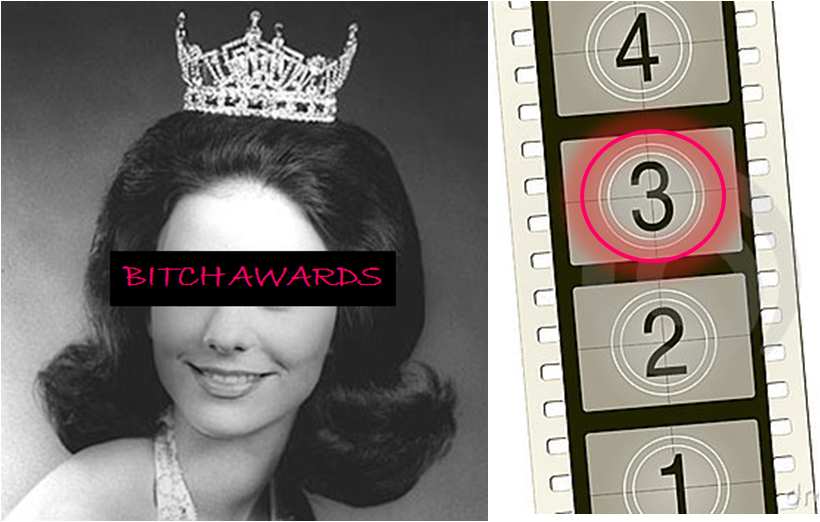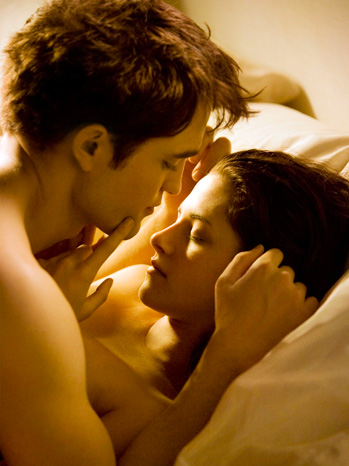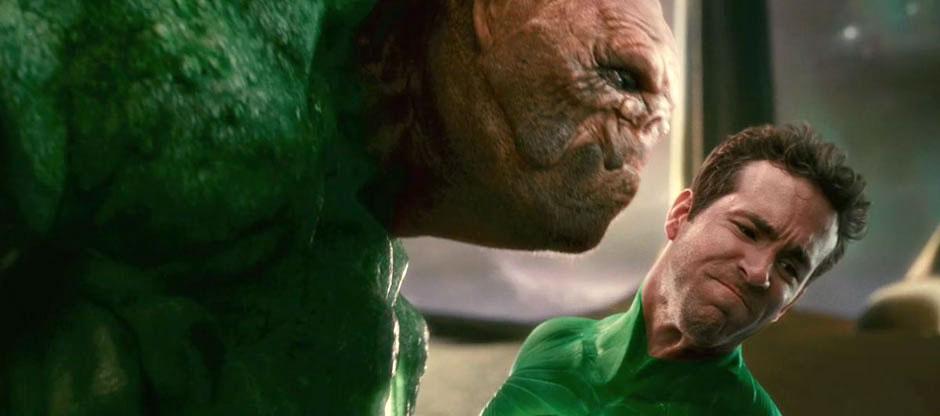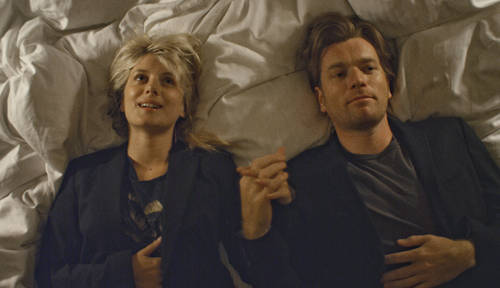 Welcome to the first annual Bitch Awards – the completely inconsequential end of year awards that celebrate 2011’s best – and worst – films and television shows. Stick around for the next two weeks as we raise a glass to our favourite films and television shows of the year and duck as we unceremoniously throw the remote at our least favourites.
Welcome to the first annual Bitch Awards – the completely inconsequential end of year awards that celebrate 2011’s best – and worst – films and television shows. Stick around for the next two weeks as we raise a glass to our favourite films and television shows of the year and duck as we unceremoniously throw the remote at our least favourites.
We’re up to #3 for our picks for best and worst films of the year.
WORST
TVangie:
#4: The Adjustment Bureau (Nolfi, 2011)
#3: The Twilight Saga: Breaking Dawn – Part 1 (Condon, 2011)
Caveat: I went into The Twilight Saga: Breaking Dawn Part One knowing that I needed a spot filled on my worst list, so it really didn’t have much of a chance from the beginning. I’ve read all the books and watched all the other films, so at the very least, my hatred is somewhat educated.
Yah, this movie was horrible. But not the worst in the franchise (that particular honour goes to the second film, New Moon). Where to begin? Let’s ignore how horrendous the source material is and how unfortunate it is that our young ladies are looking up to Bella as some sort of role model… (there are plenty of blogs already doing this. Simply type in “The problem with Twilight” and Google will give you more than enough reading material…) No, let’s focus instead on the biggest problem with this and all the other films – the acting. I will say that Kristen Stewart’s Bella is the least offensive of the main protagonists, but she’s still pretty bad. [Case in point: “Woah. (looking at her flatter than flat stomach) I think I’m pregnant.” Keanu Reeves, meet your match]. The thing is, as bad as Stewart is, Robert Pattison’s Edward and Taylor Lautner’s Jacob are just so, so bad. It’s like they’re not even trying to convey any kind of authenticity in their acting. Dudes- you’re not reading directly from the script. Are you off-book? Because you sure as hell aren’t delivering the lines like you are.
A particularly good example: Jacob in “wolf” form growling at his tribe mates (whom I can only identify as the ‘miscellaneous shirtless group’). Yes, the wolves look “realistic” I suppose, but they’re trying to have a serious conversation while growling at one another. Some really horrible voice-over work accompanies (Picture every word with a sentence after it. That’s when you know it’s wolfspeak. Yes. it. ISSSSS!). I’m sorry, but when the wolves got angry and the little wrinkles appeared on their snouts- it was just precious. I just wanted to squeeze those little puppies and give them a big kiss. Hardly the reaction that this “intense” confrontation was going for.
Even the heavily-hyped scene where Edward and Bella finally get it on was a letdown. Just like the book, it was a fade to black. This is fine considering the target demographic and the rating of the film, but don’t build it up as the most salacious thing audiences have ever seen only to deliver something tamer than what’s on prime time television these days.
Aside from that, the film does LOOK stunning. The wedding scene in particular is beautiful, but it’s hardly enough to save the film. I will also credit the special FX team for an amazing job, particularly with Bella (SPOILER ALERT) during the last stages of her pregnancy. She is quite believably rendered disgustingly skinny and gaunt for almost the entire third act. (END SPOILERS) It’s too bad there wasn’t any budget left to make the vampires look paler and avoiding that horrible white makeup. And the contact lenses! I know it’s petty, but seriously – how am I supposed to believe these vampires are irresistibly beautiful when they’re clearly wearing dime-store variety, coloured contact lenses?
There’s just too much bad in this movie to make it worth anything more than a “so-bad-its-good” film (which even then, it can’t even achieve. There’s absolutely no self-awareness. Nope – this film is really trying it’s best to be good!) Am I advocating that Twilight go Batman Forever? Perhaps. At least that would be interesting.
Side Note: At the wedding we meet the Denali vampires, surprisingly, all actors from excellent television shows: Dexter‘s Ice Truck Killer, Christian Camargo, Alias‘ Mia Maestro, and Lost‘s Maggie Grace. Their introduction is uncomfortably awkward and contrived, further exhibiting what bad dialogue can do to good actors. Stick to the small screen my friends; you can do much better than this.
Cinephilactic:
#4: Horrible Bosses (Gordon, 2011)
#3: Green Lantern (Campbell, 2011)
2011 was a banner year for Superheroes films. In anticipation of next year’s The Avengers, The Amazing Spiderman and Dark Knight Rises, Hollywood continues to churn out action films based on characters who dress up, power up, and save the world. This year brought four superhero films (Thor, X-Men: First Class, Captain America and Green Lantern) and they were all great…with the exception of Green Lantern.
The film had its work cut out for it from the start: it’s an ambitious story that features a plethora of intergalactic characters, a significant portion takes place in space, and the protagonist’s powers come from a lantern, a ring, and the colour green. These are superhero elements that only a mother could love. The film had difficulty determining if it was a comedy, an action film, a romance or a science-fiction epic and early trailers featuring heavily criticized special effects didn’t help. But none of this would have mattered if the film itself had actually been good.
At its core, the blame for this one lays on the shoulders of writers Greg Berlanti and Michael Green, who wrote a film without interesting characters and made the villain a laughable cloud that’s easily disposed of (despite being referred to as a “world killer” and decimating centuries-old members of the Lantern corps). Most frustrating is Berlanti and Green’s decision to strap on an inexplicable denouement meant to set up a sequel – that will likely never happen – that does a disservice to one of the most interesting characters, Mark Strong’s Sinestro.
Stuck in the middle is Ryan Reynolds as Hal Jordan’s (easily the best part of the film), trying his darndest to sell the schlock as gold and secure his own franchise. He’s given no help from the supporting cast, including Blake Lively who looks pretty, but has nothing to do (she’s a fighter pilot why exactly?), and Peter Sarsgaard who has the misfortune to portray a character saddled with a Mr. PotatoHead prosthetic. And why the hell does everyone have daddy issues?!
If you have the capacity to put your mind in neutral and phase out for two hours, the movie looks decent and Reynolds really is trying his best. Director Martin Campbell manages to get the juices flowing with a few action sequences, but overall the film is riddled with problems that cause everything to collapse like a house of cards the moment you begin to think.
Drinking games and/or extreme dedication to the character might make this palatable, but for now…this lantern’s not worth lighting. Oof that was bad, though not as bad as the movie.
BEST
TVangie:
#5: Margin Call (Chandor, 2011)
#3: Win Win (McCarthy, 2011)
Win Win is one of those films that’s flown under the radar and it really is a shame because (to use a hackney cliché) it’s a gem of a film. I knew nothing about this going in except a friend telling me it was ‘mid-life crisis’ film. I still approached it with an open mind, albeit one hidden behind a raised eyebrow of doubt (the doubtbrow?). And I’m sure glad I did because I left the theatre really loving this film.
Brief summary: Mike Flaherty (Paul Giamatti, who seriously can do no wrong) is a struggling lawyer who, in his spare time, acts as a wrestling coach for the local high school. When presented with the opportunity, Flaherty does something questionable in relation to one of his only (elderly) clients in order to make financial ends meet. This inadvertently brings Kyle (Alex Shaffer) into his life, who coincidentally happens to be one of the greatest wrestling protégés. And naturally, Flaherty’s wrestling team is currently ranked dead last. Yes, it all sounds very constructed and contrived when I summarize it, but believe me, the film’s greatest strength is actually how authentic and relatable it manages to be.
Although it does adhere quite closely to the conventions of the ‘under-dog sports’ film, it proves to be much more than that. It’s hardly an astute observation, but type-cast Giamatti really steals the show here, portraying the down-on–his-luck, lovable loser that we’ve come to know him for. In fact, the film is chalked full of stereotypical archetypes: the no nonsense, say-what-she-feels wife (Amy Ryan), the inappropriate yet charming Entourage-reject friend (Bobby Cannavale), and the apathetic but filled-with-oh-so-much-potential teenager (played seamlessly by Shaffer).
What makes the film memorable is its ability to acknowledge its prescribed boundaries. Rather than fight them, the film chooses to get comfortable and really inhabit its genre – to the point where you forget that it’s something we’ve seen time and time again. Don’t expect to find any grandiose revelations here – it’s about strong performances, some great dead-pan comedic moments, and getting a glimpse into the life of an endearing, yet flawed, protagonist. It’s no small feat to get your audience to relate to something that is so far away from its reality. I felt grounded yet simultaneously transported to another world, and that’s what makes this one a best for me.
It’s a cop-out, but this is really just a good film.
Cinephilactic:
#3: Beginners (Mills, 2010)
Beginners is to me what Margin Call was to TVangie. It is a film that I heard good things about, but didn’t have high expectations for. Most critics have singled out Christopher Plummer’s role – as an elderly man who finally has the chance to explore his homosexuality in the wake of his wife’s death – as the best aspect of the film.
However, that role isn’t why Beginners is my second favourite film of 2011. I don’t even particular care for Plummer in the film: I find his performance over the top and stereotypical for my tastes. I think that it’s a showy role for an actor who has always contributed a great deal to his films who hasn’t received a lot of critical kudos. So good for him.
No, what I love about the film is the relationship between Ewan McGregor’s Oliver and Melanie Laurent’s Anna. I love their meet cute at a Halloween party in which he, dressed up as Freud, psychoanalyzes her while she responds only through words because she has laryngitis. It’s a perfect example of a relationship that is young, energetic, confusing and challenging. These two damaged people are trying to find common ground and we’re tagging along for their domestic adventures. She’s on the run from a past that she doesn’t want to address, and he’s mourning for his dead father (Plummer) and working out issues from his childhood.
The fact that Plummer dies is not a spoiler, by the way. He’s dead when the movie begins, which is one of the other great elements of the film: the way that Mills constructs his narrative across three time periods. The first is the present as Oliver and Anna meet, begin a relationship and try to make it work. The second is the time following Oliver’s mother’s death when his father came out officially, lived life to the fullest, and then died. And the third (and least frequently visited) time period is when Oliver was a young boy, growing up with an absent father and an overbearing, unhappy mother who suspects that her husband doesn’t fully love her. The way that the three timelines intersect may what might have been a more conventional film that much more poignant – we have a better appreciation of Oliver’s feelings because we live them with him. It’s a very simple, but effective technique and it pulls us into his story.
I’m making the movie sound boring, but I swear that it’s not. The interactions between McGregor and Plummer are humourous and touching (and I’d be lying if I didn’t say that it’s refreshing to see a character like Oliver be so nonchalant about homosexuality). The romance between McGregor and Laurent is movie magic, and occasionally reminded me of the whimsy and innocence of Amelie. Everything about Laurent is gorgeous and beautiful and I’m a complete sucker for her here in the same way I was for her in Tarantino’s Inglorious Bastards. She absolutely captures my attention and makes me feel in love for her (and I work for boys, so that’s no mean feat). There’s even a dog for comedic relief to keep the pathos from becoming too much.
Beginners, in many ways, represents what I like about awards season: smaller films that may ordinarily struggle to find an audience have a chance to break out. Although I’m not a great fan of Plummer, his nominations and wins for Best Support Actor for a variety of critics and awards groups has cast a spotlight on a well-crafted film that has the capacity to touch hearts and inspire passion about movies. That’s what Beginners is to me: a reminder that these films still exist and they’re out there, just waiting to be discovered.
—-
We’re almost there. Check back tomorrow for our number two picks of the year and remember to contribute your thoughts on our choices in the comments below.




Good choices, i still really need to see Win Win. Breaking Dawn Part 1…. ugh… that was the most awkward movie I have ever seen!
Win-Win is pure genius. Loved that film. Now, I have to see Beginners.